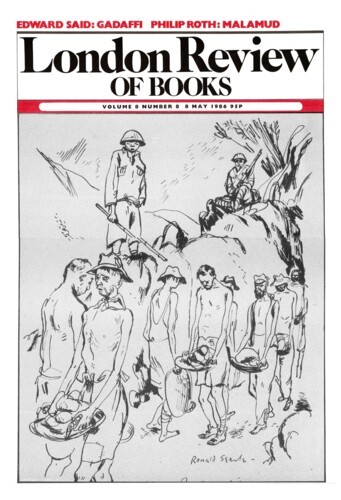I could only dream, I could never draw,
In Art with the terrifying Mrs Jaspar
Whom I would have done anything to please.
Aquiline and aloof in the land of the button nose, her smile
Made her seem a witch, my goddess,
Too cool, too cold. She was my muse
Because she hardly spoke a word.
We used to pronounce her name to rhyme with Casbah,
Mimicking her fahncy Locust Valley lockjaw.
Say Christ through your nose!
Part of her allure and majesty and
Wonderful strange music for St Louis certainly,
Though not as musical as her silence was. Casbah,
White flannels on a summer evening, Jasbah,
Endless lawn down to the sea. The accent
Was preposterous, the voice beautiful
Green running down to the sea nine hundred miles inland,
Preposterous. The accent
Was preposterous, her beautiful voice a
Bassoon, slow velvet cadence of the sound,
Shy but deep. Shy but deep. Clangs/The bell. Eliot.
The lips are drawn back slightly;
As if it had been hinged that way, the jaw doesn’t quite close –
Actually, the opposite of lockjaw since it
Moves, and it doesn’t close.
The very back of the throat without the use of the lips
Produces the bloated drawl of the upper class.
You hear it in a certain set, you see it in a certain scene,
Which has equivalents abroad who sound incredibly the same,
And bong the same aristocrat gong in their own languages.
The stag-hunting gang in France who hunt on horseback.
Most aquiline being the honorary hunt servants
In livery and wearing tricorns, always
Dukes and such and others who
The very back of the throat without using the lips much.
It is an accent you can see –
That you could hear through soundproof glass from what you saw.
It is a sound you see in the Sologne when
The huntsman blows his haunting horn.
The hounds open their mouths. Silence. The servants in their
White breeches and long blue coats dismount. The
Stag stands in the water dropping tears of terror and exhaustion.
They do that when the hunt has them at bay.
The king is in his counting-house counting out his money.
His head will be hacked off and saved;
The carcass goes to the dogs – after the servants drink the blood
And defecate. There is another accent, that goes to Harvard,
That anyone who does can have. My babysitter
Harold Brodkey will. One day I, too, I will.
The servants dip their fingers in
The blood and paint themselves, and smear each other’s blouses,
With all the time in the world apparently until it’s time. It’s time
To pass the chalice and drink. They defecate
In their breeches, but their coats are quite long,
The flecks on their boots are only mud,
Everything I’ve written here is lies.
The flecks could be flecks of blood,
But the coat-tails completely hide the other. There’s a smell.
Though there’s the smell rising in silence
From the page, but that’s a lie. Brodkey knows. Lies that rise.
Now my unseen neighbour in New York four blocks away.
He is finishing the novel, he knows
Il miglior fabbro means a bigger liar. Lies that rise.
Ab lo dolchor qu’al cor mi vai
Pound catches the thermals in every language, and soars.
Eliot rises in the pew to kneel.
When he opens his mouth it is a choir.
Les souvenirs sont cors de chasse
Dont meurt le bruit parmis les vents.
The cockpit voice recorder in its crashproof case remembers and sings.
Flesh and juice of the refreshing and delicious.
Inside a crashproof housing. But I don’t recognise the voice.
This is your Captain. In the unisex soprano of children his age.
We are trying to restart the engines
On wings of song. The pilot giggles posthumously –
‘You may kiss my hond,’ he drawls, for the last time
Holding a hond out to be kissed from this page. (Sound of crash.)
Send Letters To:
The Editor
London Review of Books,
28 Little Russell Street
London, WC1A 2HN
letters@lrb.co.uk
Please include name, address, and a telephone number.

